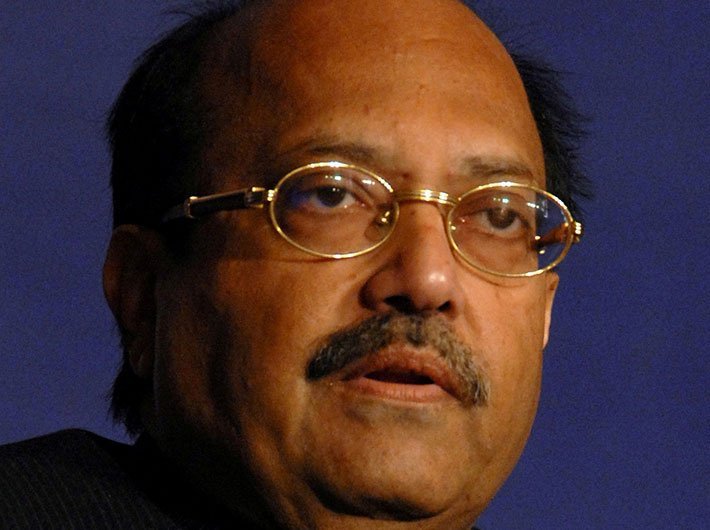Amar Singh’s rendezvous with industrialists and Bollywood gained prominence as he bailed them out of crisis.
Amar Singh, a business man who made hay while financial crisis engulfed the who’s who of politics, business or glamour, is best known for attending Bollywood award functions, posing with industrialist Anil Ambani, taking religious tours with the Big B, hopping ideologies, and his love-hate relationship with Samajwadi Party (SP) chief Mulayam Singh, who is better known as Netaji. His humble upbringing and translucent business activities often brought his combined net worth (with his wife), to the tune of more than Rs 100 crore under the scanner. It is still unclear, how a man of humble beginnings has amassed wealth and power of such magnitude.
As the SP family feud gains momentum, and the Akhilesh camp openly blames Amar Singh for the cause of rift, let us look back at who Amar Singh is and why Netaji’s love for Amar Singh is beyond reasonable explanation.
Who is Amar Singh?
According to reportage, in 1985, Vir Bahadur Singh, the then chief minister of Uttar Pradesh was in Kolkata and Amar Singh, a member of Youth Congress was entrusted with the responsibility of attending to him at a Thakur community festival. Impressed with Amar Singh’s social skills, the then CM extended him an invitation to visit UP. Thus began, Amar Singh’s affair with India’s most politically crucial state. This also marked the beginning of his friendship with Netaji, who was then a staunch socialist, worked at grass root level and followed the instructions of veteran socialist leader and thinker Madhu Limaye.
Amar Singh’s rendezvous with industrialists and Bollywood gained prominence as he bailed them out of crisis, either by offering them financial aid or liaising for them at Lutyens’ Delhi. He wielded influence and power within both, rustic politicians and elite socialites. Mid 90s, Amar Singh had personally achieved very little political or professional success. There is little information on his business activities that justify his exponential social and financial growth. With Bachchan on his left, and Ambani on his right, Singh had apparently little to worry about.
Why did Amar Singh help Netaji?
In the meanwhile, Mulayam Singh Yadav’s political aspirations had reached Delhi. However, his reach was limited within the boundaries of his state. During the 1996 Lok Sabha elections, Mulayam Singh Yadav saw the Third Front as a potential gateway to Delhi. Now a cabinet member and minister of defence, Mulayam Singh Yadav saw political merit in forging ties with Amar Singh. Amar Singh was soon appointed as the general secretary of Samajwadi Party, dwarfing the existing team of SP loyalists like Raj Babbar, Beni Prasad Verma, Azam Khan and Netaji’s younger brother, Shivpal Yadav.
Amar Singh’s political aspirations were insatiable. He became SP’s spokesperson, and was elected to Rajya Sabha in 1996 itself. The power equation in SP continued to skew in favour of Singh. He enjoyed clout amongst industrialists, who knew him as the man who could get work done in literally a single phone call. Industrialists funded SP through their nose, and Singh was suitably rewarded. He was re-elected to Rajya Sabha in 2002. Industrialists reached out to Amar Singh not only for legal permissions, tenders, land acquisitions; he was also their official event manager. Glamour industry was at his beck and call, ready to dance at a big wig’s son’s wedding for an unheard of amount. Amar Singh was the bridge between politics and glamour; he added gloss to power. On the other hand, he was instrumental in breeding a culture of star campaigners and star politicians in north India. He was the cash cow for SP, though he ensured he saved the cream for himself.
His ability to get the political industrial celeb mix was so lethal that Netaji deserted his socialist ideals for a hard-core socialite.
Why did Amar Singh lose steam?
Amidst the multiple controversies and corruption charges, Amar Singh was yet to win an election, connect with SP vote bank, or prove himself to be a 24/7 politician. Singh’s opulent ways were held responsible for the party losing ground to BSP. He made some lifetime enemies in SP, who continue to haunt him, even today.
While Amar Singh failed to establish a connect with the common man, he was also facing stiff competition from patriarch’s own son. Akhilesh Yadav not only enjoyed strong internal party support, he had the love of the people with his youthful energy and pro-development agenda. He was looked upon as the natural successor to Netaji, making things difficult for Singh. Moreover, Netaji did not see himself in Delhi anytime soon. Singh was a diminishing marginal utility curve, as his ties with Bollywood faded, and industrialists saw him as a mere broker of power. In 2010, when Amar Singh staged a coup against Akhilesh’s wife, his intentions for SP and Yadav family were exposed.
Netaji expelled Singh, post which he announced retirement from active political life.
Does Amar Singh still matter?
Friends to foes, Singh’s network lost its charm. His appearances at social events reduced, his health declined, Singh was a setting sun that had basked in its glory, by just being around stars.
Six years hence, Netaji caught everyone off guard by mending fences with Singh again. With impending 2017 elections and Netaji reinstating Singh in the party with due power and position, is Netaji making plans for a larger role at Lutyens, yet again? How will Netaji meet Singh’s expectations and his son’s aspirations? Does Singh still have it in him to make kings? Has Singh’s charm faded with time, or is he really a man of action? Some questions are still hanging mid-air.
(Kapoor is an associate fellow at Pahle India foundation)
